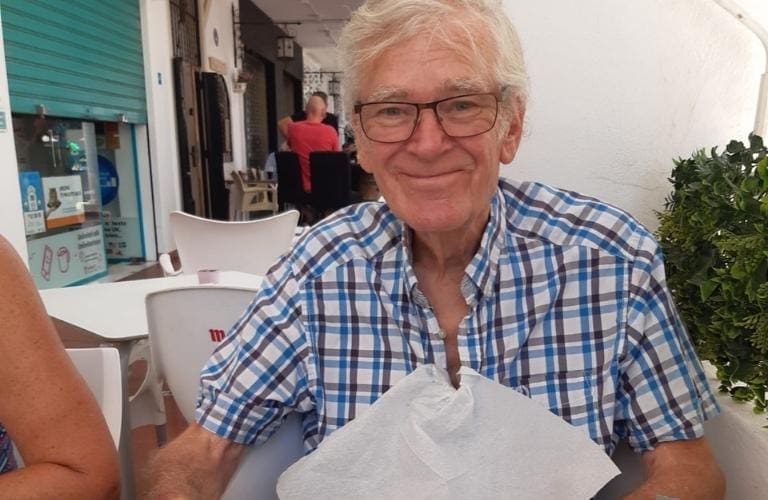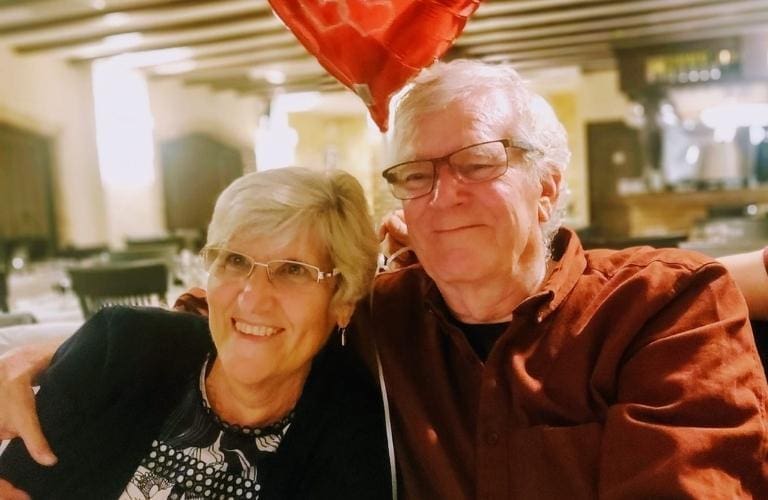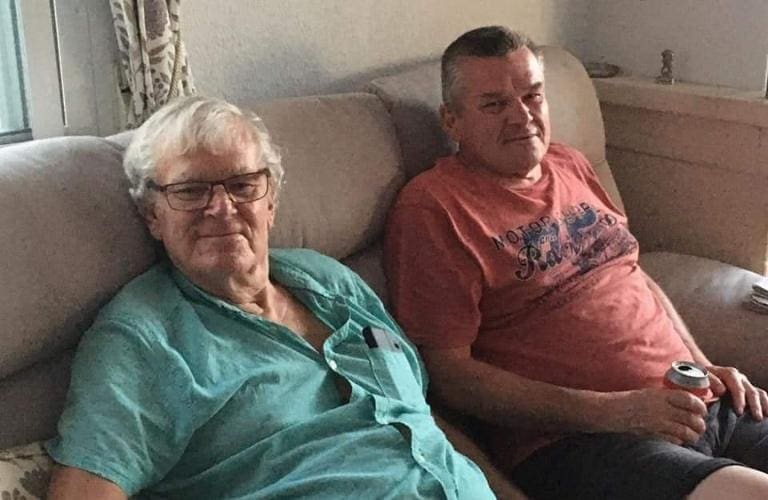Paul’s story: "Now I’ve taken that first step, it won’t be my last call to the Helpline"
Paul’s story shares the difficulties with mental health that many people experience after a loved one has been diagnosed with dementia.

Paul’s dad
Dad was a lorry driver for most of his working life. He also loved drawing and whenever we used to go somewhere new, he would always draw a map for us.
Dad and I used to love going fishing together. I’ve even got a tattoo dedicated to our fishing days together. Mum and Dad moved to Spain three years ago and my sister and brother-in-law also live out there. My wife and I are living near London with our two sons, aged 28 and 31.
Getting a diagnosis
Dad’s symptoms started five years ago when he was living on the Isle of Wight. He had a couple of falls, and his walking was badly affected.
We went to the GP, who initially suspected that Dad had Parkinson’s. He was prescribed some medication but not referred to a specialist at that time. When Mum and Dad moved to Spain, Dad took a downhill turn. He was referred to a neurologist who diagnosed him with vascular dementia. Dad was still having issues walking, so he was then re-referred to a second neurologist who diagnosed him with Lewy body dementia.

Paul’s mum and dad
Caring from a distance
Mum tried her best to care for Dad at home, but he became incontinent and was having accidents all the time. He just wasn’t safe at home anymore. We made the very difficult decision to put him in a care home.
It’s difficult living so far away from Dad and caring from a distance. I try to get out to Spain four times a year and speak to Dad every other day on the phone, but I never know what mood he is going to be in when I call. I also wish I was closer to support my mum, sister and brother-in-law more.
Dad often forgets that I don’t live close by. He sometimes asks me to bring him a bag of chips. I try to joke with him by saying that they will be cold by the time I get there. It’s really difficult to know whether to keep reminding him that I’m not in Spain or to just go along with his version of reality.
Feeling overwhelmed
Dad’s dementia has affected me in so many different ways. I think about all the things Dad is going to miss out on in the future. There have been days when I have just cried because I want my dad back. Even though he is still here, he isn’t the person he was.
I feel like I’ve forgotten how to laugh: things I used to find funny just don’t make me smile anymore.
Things got on top of me at work one day and I felt like I was in a fishbowl. I got in the car and left, and I honestly don’t remember the drive home – I was on autopilot. I realise now that I’d had an anxiety attack because I felt so overwhelmed and worried about Dad.
I don’t usually show my emotions and I tend to bottle things up, but this time, I knew I needed some support. I researched Dementia UK and came across the Dementia Helpline. I plucked up the courage to send an email and within an hour I was on the phone to a dementia specialist Admiral Nurse, Mark.

Paul and his dad
Calling the Helpline
Speaking to Mark felt like a weight had been lifted off my shoulders. He reassured me that I was doing everything right and that I was doing a good job. Sometimes you just need someone to listen to you: a problem shared really is a problem halved.
As much as you can talk to your friends and family, there is a huge benefit to talking to a dementia specialist. I’ve only spoken to Mark once, but he truly understood what we are going through and how to help. He gave me some practical advice and suggested that I try video-calling Dad. This is something that I’m planning to try.
Mark even spoke to me about my two sons and how they might be dealing with their grandad’s dementia. My youngest son and I have now purchased an old Mini Cooper car and we are doing it up as a kind of therapy project together.
Being able to pick the phone up to speak to Mark was fantastic. I felt so reassured after the call. I honestly can’t fault the Helpline: I would give it five stars and recommend it to anyone. I literally want to shout about it from the rooftops.
It won’t be my last call to the Helpline
It takes courage to realise that you are struggling. Making that initial call was scary but I know now that I can speak to a specialist dementia nurse whenever I feel overwhelmed.
Now I’ve taken that first step, it won’t be my last call to the Helpline. It is so reassuring to know that I have someone I can talk to. I know I’m in safe hands.
Reading the stories of other people affected by dementia on the Dementia UK website makes me feel less alone, so if sharing my story gives someone else hope, then it’s worth it. I hope it will encourage other people to pick up the phone and call the Helpline if they need support.
Admiral Nurse Mark shares how he supports people on the Dementia Helpline
“I love making a difference, giving people hope, inspiration, ideas and coping strategies, and understanding their needs to help them manage dementia. People are thankful to have a conversation, especially with Covid-19 causing so many families to experience a lack of social contact and connection. It’s so rewarding when callers thank you for helping them.
People who call us on the Helpline can be distressed at times and those conversations can be challenging to have. I’ve found the positive thoughts and comments received from individuals and families who I’ve supported to be overwhelming. I really do appreciate the recognition.
The feeling that I’ve helped someone at the end of the call is really satisfying, and that’s where my empathy and understanding really come to the fore. By putting myself in someone’s shoes, I can advise and be a sounding board.”
Sadly, Paul’s Dad passed away earlier this year.
